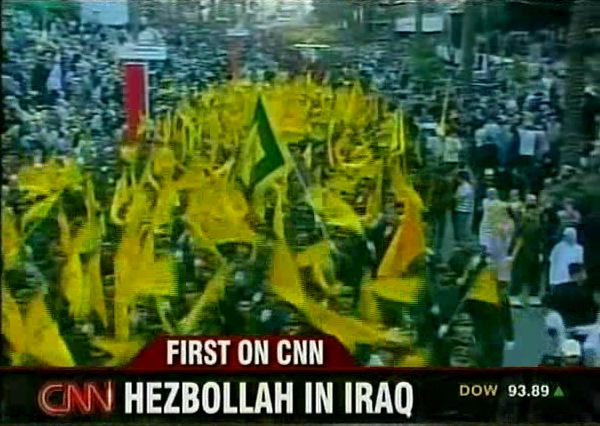NR: Update of the Hezbollah story

Click photo to play
Length: 5:31
BETTY NGUYEN: Well, there is a new enemy operating in Iraq. The U.S. military confirming a story first reported right here on CNN. Hezbollah fighters from Lebanon aligning with Iraq's Quds Force Special Operations Unit to coordinate attacks on U.S. troops.
(BEGIN VIDEO CLIP)
BRIG. GEN. KEVIN BERGNER, MULTINATIONAL FORCE-IRAQ SPOKESMAN: Quds Force, along with Hezbollah instructors, train approximately 20 to 60 Iraqis at a time, sending them back to Iraq organized into these "special groups." They're being taught how to use EFPs, mortars, rockets, as well as intelligence, sniper, and kidnapping operations.
(END VIDEO CLIP)
NGUYEN: Well, CNN's Michael Ware first broke this story and has exclusive details.
(BEGIN VIDEOTAPE)
MICHAEL WARE, CNN CORRESPONDENT (voice-over): These men are masters of guerilla warfare: Lebanon's Hezbollah. Last year, they claimed victory over the might of the Israeli Defense Force. Now believed to be fighting another war in Iraq.
U.S. intelligence sources say they have captured one of Hezbollah's top special operations commanders, Ali Musssa Daqduq. Said to be an expert with these roadside bombs, his role in Iraq was so covert, there are no known pictures of him here, save for this prison mug shot and a confession, which coalition forces have not released. Captured on March 20 in the southern city of Basra, the Americans say he and the Iraqi militia commanders he trained and led admitted working with Iran's elite Quds Force Special Operations Unit.
Documents, forensic evidence, and the personal effects of dead American soldiers seen by members of the Iraqi government and shown to CNN support their claims. After months of interviews with Shi'ia militia members in Iraq, as well as Iraqi government and intelligence officials, CNN sought the U.S. military's comment, but it was not until today that the military confirmed the arrest.
BERGNER: He is Lebanese-born and has served for the past 24 years in Lebanese Hezbollah. He was in Iraq working as a surrogate for Iranian Revolutionary Guard Corps Quds Force operatives involved with "special groups."
WARE: Senior U.S. intelligence officials say their confirmation of Hezbollah's long-rumored involvement in Iraq began with this: the January 20 attack on American soldiers in Karbala, a well-planned attempt to kidnap five GIs that went horribly wrong, ending with the soldiers' execution.
Senior U.S. military officials tell CNN that after the attack, the order came to hunt down the men responsible and kill or capture them. That mission has been a stunning success. A few weeks ago, during a raid in Baghdad's Sadr City slum, American and Iraqi forces killed this man, Azar al-Dulaimi, said to be the mastermind who led the Karbala attack. While Mahdi army militiamen mourned his death in this memorial in Sadr City filmed by CNN, coalition operations across the country had already seen most of those behind the kidnap attempt killed or imprisoned.
Early results in the U.S. investigation led to this man, Qais Khazali, seen here in 2003 when he was the spokesman for rebel cleric Muqtada al-Sadr's Mahdi army. By the time of his March arrest, he had left the Mahdi army and come to head one of the most feared organizations in the country, known as the "special groups," a well-trained, well-financed and efficient paramilitary unit modeled on Hezbollah. And according to U.S. intelligence sponsored by Iran's Quds Force, a claim Hezbollah's Daqduq and the Iraqi leader Khazali have apparently admitted during their interrogations.
Looking for Khazali, the coalition troops found more than even they had hoped: computer documents detailing the planning, training and conduct of the failed kidnap. What they didn't know is they had also scooped up Hezbollah's advisor to the Iraqi "special groups." Originally pretending to be deaf and mute, Daqduq's real identity was not revealed for weeks. Once uncovered, though, American officials say he began to talk.
The Americans now believe his role was crucial to the Karbala attack. What remains a mystery is why Lebanese Hezbollah's leadership would risk sending advisors to Iraq. American intelligence officers suspect Hezbollah had no choice - indebted to Iran's Quds Force for its decades of military and financial support.
Contacted by CNN, a Hezbollah spokesman in Lebanon said he would not dignify the U.S. allegations with a response. And though representatives of Iraq's Mahdi army militia and cleric Muqtada al-Sadr say they share some of Hezbollah's ideals, they deny receiving any military aid.
"I say clearly that we do not accept any logistics, financial, or any other kind of support from anyone outside the borders of Iraq," says this advisor to Sadr. The Iraqi government declined to comment. And though Tehran has repeatedly denied arming or aiding any militia forces in Iraq, Daqduq's arrest and the weight of Washington's new evidence of Hezbollah's presence in Iraq may just demand fresh answers from Iran.
Michael Ware, CNN, Baghdad.
